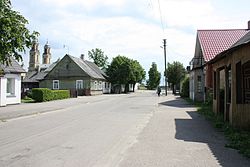Vievis
| Vievis | ||
|---|---|---|
| City | ||

Trakų st.
|
||
|
||
| Location of Vievis | ||
| Coordinates: 54°46′30″N 24°48′30″E / 54.77500°N 24.80833°ECoordinates: 54°46′30″N 24°48′30″E / 54.77500°N 24.80833°E | ||
| Country |
|
|
| Ethnographic region | Dzūkija | |
| County | Vilnius County | |
| Municipality | Elektrėnai municipality | |
| Eldership | Vievis eldership | |
| Capital of | Vievis eldership | |
| First mentioned | 1539 | |
| Granted city rights | 1950 | |
| Population (2005) | ||
| • Total | 5,246 | |
| Time zone | EET (UTC+2) | |
| • Summer (DST) | EEST (UTC+3) | |
Vievis (![]() pronunciation , Polish: Jewie, Russian: Евье, Yev’ye) is a small city in Elektrėnai municipality, Lithuania. It is located 14 km east of Elektrėnai. The city is surrounded by Lake Vievis.
pronunciation , Polish: Jewie, Russian: Евье, Yev’ye) is a small city in Elektrėnai municipality, Lithuania. It is located 14 km east of Elektrėnai. The city is surrounded by Lake Vievis.
Its alternate names include Anastasevskaya, Jewie (Polish), Vevis, Vievio, Viyevis, V’yevis, and Yev’ye.
In 1522 year the Vievis manor, in 1539 year - town, which belonged to Ogiński family, was mentioned. In the first half of 16th century the first Catholic church was built there.
About 1600, Ogiński family built a Uniate church and founded the Abbey of the Holy Spirit (Lithuanian: Šventosios dvasios). At the beginning of the 17th century a printing press was established near the abbey, notable for printing books by various Protestant Calvinist scholars.
In 1794 and 1812, the church burned down and was rebuilt in 1816. In 1837 an Orthodox church was built.
In the period between World War I and World War II, Vievis was near the dividing line between Lithuania and Poland. The town used to be among those with the largest Polish population, with roughly 77% inhabitants identifying themselves as Poles. In 2011 census, only 10.9% of inhabitants identified themselves as Poles as well as 3.74% Russians and 82.56% Lithuanians.
...
Wikipedia


